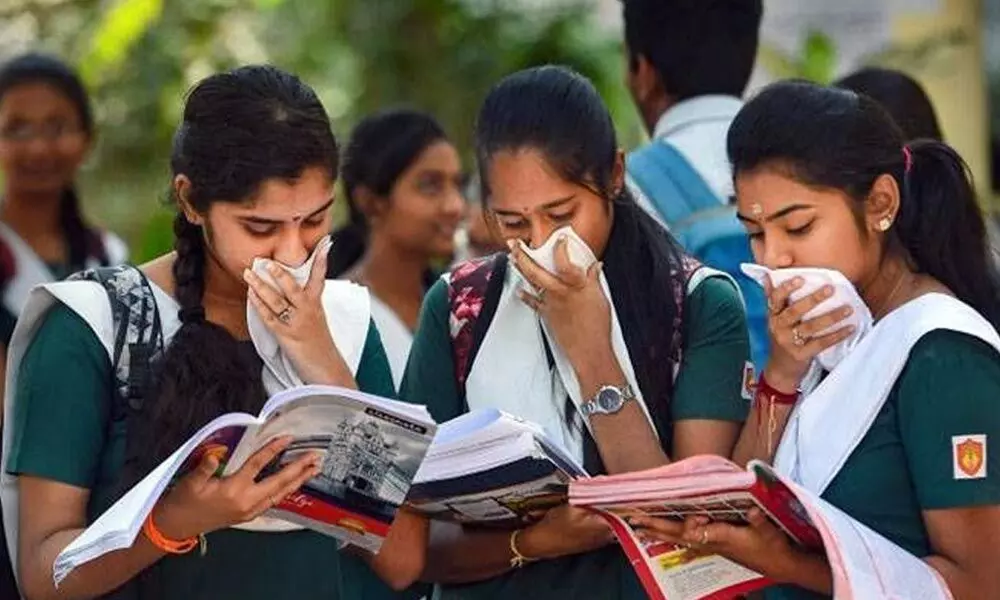Live
- They always want me to win, and now I feel lucky to have been offered a story like ‘Zebra’: Satyadev Kancharana
- ‘Democracy first, humanity first’: PM Modi in Guyana's parliament on two countries' similarities
- PKL Season 11: Telugu Titans register third straight win to top standings
- Is Pollution Contributing to Your COPD?
- NASA Unveils Underwater Robots for Exploring Jupiter's Moons
- Additional Central forces arrive in violence-hit Manipur
- AR Rahman and Saira Banu’s Divorce: Legal Insights into Common Issues in Bollywood Marriages
- 82.7 pc work completed in HPCL Rajasthan Refinery area: official
- Curfew relaxation extended in 5 Manipur districts on Friday
- Tab scam prompts Bengal govt to adopt caution over fund disbursement
Just In
How safe is unlock 4.0 phase for schools and colleges?


How safe is unlock 3.0 phase for schools and colleges?
Education should be opened up
"Education should be opened up. Covid-19 may continue for a year more. Are you going to wait for another year? Do you know what the loss for the country is and the career peril for the students?'' Justice Arun Mishra observed while rejecting the plea for postponement of NEET. The situation now is very unpredictable, and procrastination simply means hoping for good normal days which are not likely to come soon.
When a virus develops into a health hazard of pandemic proportions, with no proper medical treatment, then the only way out is to start to learn to live with it. Self-resistance and immunity boost can work best. In March 2020, when the lockdown was first announced for 11 days, the schools and colleges were closed for the period but as the situation continued to worsen, educational institutions were closed sine die.
Since June onwards, the unlock 1.0 started with the standard operating procedure (SOP) and preventive measures in place for shopping malls, restaurants, shops, religious places, workplaces etc, while the containment zone areas were to observe lockdown with several restrictions. Again, the unlock 2.0 rolled out rules easing the movement and other restrictions with continued night curfew. However, it did not permit opening of schools and colleges.
Subsequently in unlock 3.0, the gyms and yoga centres were opened, and the night curfew was revoked but the educational institutions remain closed. As of today, the number of Covid-19 cases recorded across the country is almost 30 lakhs. Amid the rising cases, Andhra Pradesh Chief Minister YS Jagan Mohan Reddy has announced the decision to reopen schools and colleges from September 5 and October 15 respectively.
There are different views on this issue in various States. Now the question is, how far this idea of reopening educational institutions is going to work out? And, if the reopening is further postponed, till when this situation is going to last? What safety measures are to be taken for students if the educational institutions are reopened?
Around the world, the schools and colleges started opening with safety measures in some places, and to everyone's surprise, a high school in Indiana (USA) had to shift to online learning after just two days. And students in Mississippi (USA) were forced to quarantine after classmates tested positive for coronavirus during the first week of classes. This signals that opening up educational institutions and gathering of students in mass numbers is still dangerous and the Covid-19 pandemic may affect all despite the measures taken.
Considering the seriousness of the problem, the UPSC Civil Services Prelims examination, which was scheduled to be held on May 31, was postponed to October 4. Other important examinations like NEET, JEE and other common entrance tests are scheduled in September and the Union government has decided to conduct these by providing transportation and other required measures for safety purposes. The government is firm on its decision of conducting these exams.
However, with the rising Covid-19 cases, it is a wait and watch show to see if this really happens and how successful will the government be in taking the precautions. Apart from this, the government departments and administrative wings were holding virtual meetings. The government has even tried the online classes, but it also did not prove to be of good with numerous complaints.
On the other hand, when we take the opinion of parents on opening of institutions, they seem reluctant to send their wards to schools and colleges anytime this year. This could in one way be taken as the result of all-pervasive fear of Covid-19 that has gripped their minds. But this fear has to go. People need to be calm and they have to understand that once the vaccine is out, then the pandemic can be controlled and there will not be fatalities anymore due to the virus.
Considering all pros and cons, some of the steps for reopening educational institutes are — firstly, the government has to allow the States to conduct the entrance tests (EAMCET, PG Entrance Tests, UGC NET, IGNOU OPENMAT, Delhi University entrance test etc) scheduled in September with the safety measures. Then, after observing the situation, the schools and colleges can be reopened in the last week of September.
For a few days, for ensuring containment of Covid-19, schools and colleges should function only for thrice in week. The government will have to take steps for public transportation and for ensuring sanitisation. The government should also set up a committee to look into how the academic schedule can be continued and will it be possible to implement the new National Education Policy.
Accordingly, the government should also run awareness programme for parents to make them ready to send their wards to schools and colleges. Regular check-ups of school and college goers should be done periodically to ensure their safety. Thereafter, gradually, things will get back on track and the educational institutions can be opened full-fledged.
(The writer is an independent journalist based in Hyderabad. Views expresses are personal)

© 2024 Hyderabad Media House Limited/The Hans India. All rights reserved. Powered by hocalwire.com






